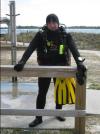
|
You’re using examples of mass market products that have a huge infratructure behind them. Regulators are low volume products and therefore I think you are compairing apples to oranges and not apples to apples. Also remember that regulator servicing is done as a sideline by a LDS and not a "day to day" activity. I agree with you it should be quicker, however I take the position that I’ll plan to get my regulators serviced when i know I’ve a period when I’m not going to be diving. For me that means the times when I’m traveling for the company I work for. Another thought to help improve the turn around time (and I don’t know your situation). You need to be seen by the LDS, where you get your regulators serviced, as a loyal customer. This may help you get your regulators serviced quicker as a thank you for being loyal to them.
|
|

|
Greg - 9/05/2013 6:21 AM 
Try finding a business that is dedicated to scuba service/repair. You should expect quicker turn around times if their sole business is equipment service. Just search online and you may find some. Usually you mail your gear in an insured box, then the business guarantees to have it serviced and returned to you within x days. May even be cheaper too.
|
|

|
It also depends often on your reg make/model. For example my LDS stocks up on parts for reg service for popular ones that they carry, but if you have an odd one (I had Cressi in my case at one point) even though they might have authorized service they’d need to order parts and that takes time sometimes.
|
|

|
My lds will do the reg service as you wait, they have the parts and a person on hand that is qualified same as with hydro and vip all is done in house
|
|

|
From Airworks: Since then I have been very careful to take my 2nd stage apart and thoroughly clean it and spray WD40 on the metal parts after every dive,
Please don’t do that. It hurts me to hear it. Rinse in clear fresh water. If you must, a mild soap. There’s no telling where that WD40 will migrate to. WD40 + Nitrox = Fire/ explosion! your regs will be fine with a rinse.
|
|

|
Been there, but if you live in the Northeast and take a few months off in the winter it;s no big deal.
Some shops farm-out the work, some have one mechanic and a lot of work.
And yes, if you find someone who actually gets them right you’re lucky!
|
|

|
Very bad idea!!! WD40
In scuba your body absorbs things more rapidly and at higher concentrations lubricants used should be food grade.
Check with a professional on what can be safely used and where and how to use it
If you should not eat it or breath it don’t use it!!!
Look at the material safety data sheet for WD40 some of the following statements.
Quotes under #2 danger, flamable, harmfull or fatal if swallowed. if swallowed may be aspirated and cause lung damage,inhalation high concentrations may causenasal and respitory irritation and nervous effects such as headache,dizziness and nausea, swallowingmay cause gastrointestinal irritation ,nasea, diarhea. if swallowed can enter the lungs and cause chemical pneumonitis, severe lung damage and death.
Be safe and have fun diving
|
|

|
If a aint broke dont fix it I do not agree with on my life and life support! Corrosion can be hidden in your regulators. True sometimes it can be worse after regs are serviced but that is the fault of who works on them. Humans make mistakes but if it repeats maybe we should not use that shop.
It is good if you are very carefull but please read up on servicing regulators and learn from profesionals. Study service manuals and books on the proper procedures before attemping to do it youself.
WD40 is a big No!!! Food grade lubricants only where specified by the manufacturer. Nitrox or any oxygen enrichment never use silicone due to fire hazard. Cristi lube and or aproved products only.
|
|

|
Greg - 9/06/2013 5:27 AM 
So my dad was wrong when he said all you need to fix stuff is WD-40 and some duct tape? :)
|
|

|
From Greg: So my dad was wrong when he said all you need to fix stuff is WD-40 and some duct tape? :)
no he was right your just missing the "bigger hammer"
|
|

|
From Airworks: By the way, WD40 is non-volatile when dry. The main active ingredient is a viscous oil that remains behind after a hydrocarbon (providing the fluid factor) evaporates. The remaining oil provides lubrication and moisture protection.
Using plain fresh water is fine for removing obvious dirt and grime usually present in small quantities even after a freshwater dive. The minimal moisture that can remain after proper flushing can be mitigated by using a light amount of WD40 sprayed onto a Qtip and applied carefully to moving metal parts of the 2nd stage. No worries; it will improve the life of your reg.
Thats fine by me, you can go on spraying Petroleum Distillates on your equipment all you want,, just dont touch ours!
|
|

|
The actual service should take less then half an hour to do the job right. Learn how to do your own service and you will see what I am talking about. If you are in the market for a new reg check out HOG, they will teach you how to do your own service and make it easy to get the parts.
|
|

|
Thanks for the heads up on Hog
I have been looking at Hog not shure which ones I want to get yet? Curently diving single tanks and pony bottles I dive with but was considering more training to dive doubles. I have steel tanks also have some bands to set up doubles probably want matching regs for ease of servicing and less parts to worry about. Allready purchased many of the special tools. been reading up on the internet on the subject down loaded manuals for some of my regs and considering some of the books requiered for servicing regs. Hard to find someone teaching the course. I feel the scuba Nazi dosent want you to be able to do it youself. Many shops get offended when you ask about training and or parts for your own regs
|
|

|
Well I just wanted to warn people of the dangers of doing something with good intentions without the proper knowledge can be dangerous! Try to share with them politely the dangers of there advice. Some people live in denial!
Still says a little WD40 is ok on your regs. Looking at his profile he has explored some caves around an island he dove at. But is not trained for cave.
If you want to hurt yourself by doing foolish things that is your own business. But I hate it when people give advice that could potentially endanger others!!!
|
|

|
The scuba nazi’s as you call them do NOT want you doing your own service. HOG is the only company that I know of to offer a course, make the parts available and manufacture the regs in a way that does not require any special tools to get into them. The other option would be to buy older regs that also do not require special tools from a manufacture who still make parts for the older regs.
|
|

|
The HOG course is only available to those who have completed some form of TEC training. A bit of a shame. I would have liked to have done the course without having done any TEC courses as i don’t think I will do any technical diving.
|
|

|
I do not get it why should Tec training be a requirement and what do you learn in a Tec course that in any way make you better qualified to clean parts install O rings disassemble and and assemble a simple mechanical device. Turn an allen wrench to adjust the pressure with a gauge or add or remove shims to adjust the pressure. lube with proper lube where required check for leaks and proper function.
How many of the worker’s in the factory in China even know how to dive?
I bet some of the workers in the factory do not know what the parts they handle are for, what a regulator is, or what it does
Is all the warranty service done by Tec divers?
Is it the requirement for all employee’s at all dive shops to have training in Tec diving before they work on a regulator?
The silly requirements just perpetuate the Gray market of parts and people that truly want to do it right because of a bad experience. They do it any way but often improperly because the cannot get the proper training or part’s from the industry.
|
|

|
The dive shop may be shipping the reg. set out for repair. Most do. I don’t think dive shops are that busy with the economy the way it is. So why else does it take that long to service gear? In most cases the owner seems to try to repair when he’s bored enough.. A decent technition needs to do at least 100 units a year minimum. I never understood the poor maketing skills of the LDS. Dive shops are run more like a hobby venture then a business. I don’t want to be the dive shops buddy. Just get my gear finished when its schedualed to be. It takes 3 hrs for me to annual service a complete 1st,2nd and octo. regulator set. Over 300 sets in the past 9 months.
|
|

|
From Greg: So my dad was wrong when he said all you need to fix stuff is WD-40 and some duct tape? :)
If he had thrown in the bailing wire, he would have had it nailed.
|
|